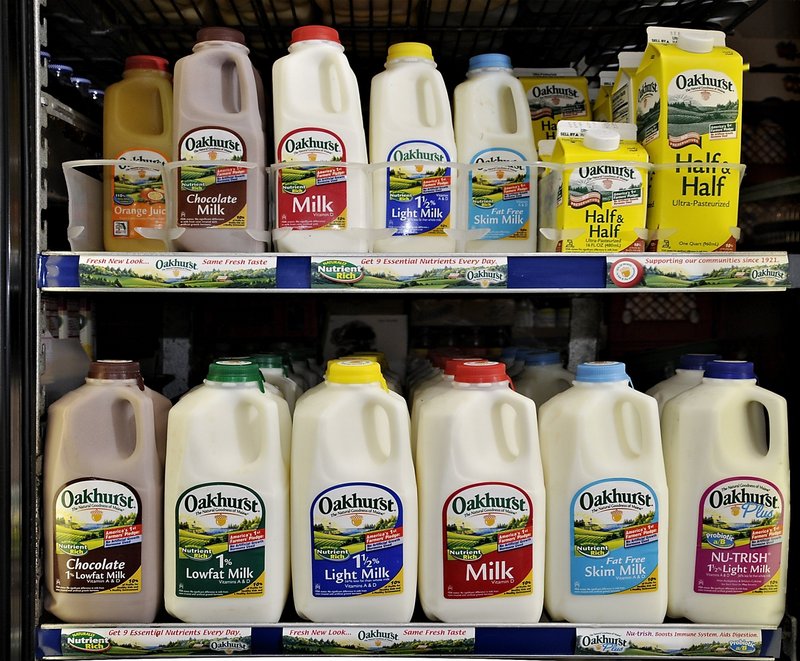WASHINGTON — Maine’s agriculture commissioner was on Capitol Hill last week to express concerns about inaction on a new, multi-year farm bill and to urge support for programs used by the state’s dairy industry.
Congress left town last month until after the November election without the House acting on a new five-year farm bill, despite a strong last-minute push from farmers, agriculture interests and lawmakers from farm states. The current farm bill expired Sept. 30, and some programs are ending.
Walt Whitcomb, commissioner of the Maine Department of Agriculture, Conservation and Forestry, has been particularly concerned about impacts to price protections for dairy farmers known as the Milk Income Loss Contract program and programs for specialty crops such as potatoes and blueberries.
A dairy farmer himself, Whitcomb met with representatives of Maine’s congressional delegation, federal agriculture officials and staffers on key congressional committees. Whitcomb is pushing for the adoption of a proposal from Maine Sen. Olympia Snowe and New York Sen. Kirsten Gillibrand that would reform the controversial, highly regulated federal milk pricing system.
BLOOMBERG BACKING JUST KEEPS COMING
New York City Mayor Michael Bloomberg apparently isn’t done advocating for former Gov. Angus King in Maine’s Senate race.
The New York Times reported Wednesday that Bloomberg — the billionaire founder of his self-named financial data services and media empire — is creating a super PAC to funnel $10 million to $15 million into select campaigns across the country in the weeks before the election.
The paper lists King’s campaign among them.
If so, this will be the third time that Bloomberg has put his name and his money behind King, an independent still regarded as the race leader. The mayor, also an independent, has already given $500,000 to Americans Elect, a nonprofit that plans to spend at least $1.7 million on independent ads intended to help King. Bloomberg also hosted a fundraiser for the candidate in New York on Tuesday.
Federal law prohibits both Americans Elect and Bloomberg’s Independence USA PAC from collaborating with the King campaign. Critics of those laws point out, however, that the prohibition is almost impossible to enforce.
The Times reported that Bloomberg plans to support candidates in state and federal races that share his views on legalizing same-sex marriage, supporting tougher gun laws and “overhauling schools.”
The campaign of the Republican contender in the Maine Senate race, Charlie Summers, has already attempted to use the Bloomberg connection to suggest that King might support additional gun control.
“Knowing that billionaire Mayor Bloomberg is bankrolling Angus King’s campaign, will King take up Bloomberg’s national gun control crusade in the Senate and push federal legislation to impose stricter limits on Mainers’ ability to own firearms?” Summers’ spokesman, Drew Brandewie, said in a written missive Tuesday.
COLLINS’ FUNDRAISING LOOKS TOWARD NEXT ELECTION
Even though her next election is still two years away, U.S. Sen. Susan Collins, R-Maine, raised more campaign cash last quarter than some Maine congressional candidates running for office this November.
Collins raised more than $100,000 during the three-month period that ended Sept. 30, according to the Republican’s latest campaign finance reports. After expenses, Collins was left with roughly $823,000 in her campaign coffers.
By comparison, Democrat Cynthia Dill raised $57,000 last quarter for her long-shot campaign to replace retiring Sen. Olympia Snowe, also R-Maine, this November. And Republican Jonathan Courtney, who is challenging Democratic U.S. Rep. Chellie Pingree in the 1st District race, pulled in roughly $67,000 for his campaign.
Collins’ fundraising activity is indicative of several political realities on Capitol Hill. The first is that incumbents nearly always have an enormous financial advantage thanks to ready access to political action committees and political donors in Washington, D.C. Nearly all of Collins’ $102,000 came from PACs or D.C.-area donors.
Another reality is that the hunt for campaign cash often begins as soon as the last election is over, which is especially true for House candidates, who must run every two years.
In 2008, Collins spent just shy of $8 million fending off a challenge by then-U.S. Rep. Tom Allen, D-1st District, who spent roughly $6.5 million. That race is still Maine’s most expensive Senate campaign, although the money count in the contest for Snowe’s seat is climbing steadily.
During the most recent quarter, Collins received $30,000 in donations from individuals, with the vast majority of those residing in the Washington area. A wide range of political action committees, or PACs, contributed another $72,000.
Much of that money was collected at two fundraisers held in Washington — including her annual Maine-Style Lobster Lunch — and a third in Las Vegas.
Washington Bureau Chief Kevin Miller can be reached at 317-6256 — cell or at: kmiller@mainetoday.com
On Twitter: @KevinMillerDC
Send questions/comments to the editors.




Comments are no longer available on this story